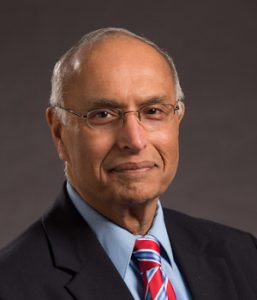
In January, the American Foundry Society named two research papers—co-authored by UWM engineering students and Professor Pradeep Rohatgi—as the best papers in their divisions.
UWM’s Materials Science & Engineering programs offer undergraduate and graduate students many such opportunities for working closely with leading researchers in their fields; Rohatgi is a UWM distinguished professor in Materials Science & Engineering, Biomedical Engineering and Mechanical Engineering.
UWM student research helps advance foundry industry
As its best paper, AFS’s Molding Methods and Materials Division selected research from UWM on low-cost foam that holds potential applications in biomedical engineering and transportation. The lead author on the paper (Cast Magnesium Foam for Energy Absorption and Bone Regrowth) was Hannah Ullberg (Materials Science ’21), whose research during her undergraduate years was supported by the UWM’s Office of Undergraduate Research-SURF Program. The paper was co-authored by graduate students Kaustubh Rane and Amir Kordijazi; and Rohatgi.
As its best paper, AFS’s Steel Division selected UWM’s research on forming corrosion-resistant surfaces on mild steel during casting processes. The paper (Sand Casting of Surface-Alloyed Butterfly Valve with Improved Hardness and Corrosion Resistance by Incorporating Metal Powders in-mold Coatings) was authored by graduate students Rane, Michael Beining, Swaroop Behera, Kordijazi, Ajay Kumar; and Rohatgi.
Mild steel, Rohatgi explains, is a popular and affordable steel used in automobiles, furniture, decorations, and water industry components. However, it is prone to corrosion as it does not contain alloying elements such as nickel and chromium. “These elements are present in more expensive stainless steel and help prevent corrosion and wear,” he says.
UWM has developed a low-cost process in which the surface of mild steel components is alloyed during casting. In addition to being lower in cost than stainless steel, the process conserves scarce alloying elements.
UWM foundry students supported by scholarships and UWM’s Office of Undergraduate Research
The students and Rohatgi will receive awards for their papers in April at North America’s largest foundry event—AFS CastExpo 2022—which draws thousands of people in metal casting, including executives, managers, technicians, engineers, sales staff, researchers, and educators.
Ullberg, Rane and Behera are recipients of Foundry Education Foundation scholarships. Like Ullberg, many undergraduates participate in research in UWM’s Foundry every year and receive additional support from UWM’s Office of Undergraduate Research.